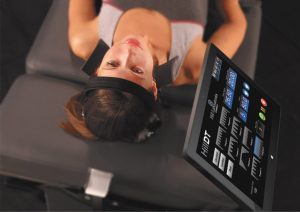By Dr. Michael Shaffer


Neck pain is known as cervicalgia and neck pain with radiating arm pain/numbness is known as cervical radiculitis. These conditions can range from annoying to debilitating. Diagnosing these conditions typically involves conducting a physical examination, reviewing your medical history, and possibly ordering imaging tests like X-rays, MRI, or CT scans to determine the cause of the pain. Neck pain is very common and most of us will have it at some point in our lives. It is usually the result of holding your neck in the same position for too long. However, other things can also cause or contribute to pain, such as:
• poor posture (the way your body is positioned when standing or sitting)
• sleeping in an awkward position
• tension in your muscles
• injury such as a muscle strain/sprain or whiplash
• prolonged use of a desktop, laptop computer or cell phone commonly referred to as Text Neck.
• a slipped spinal disc (herniated disc)
• wear and tear in the bones of the neck, which is a normal part of ageing
• wear and tear of the spinal discs (cervical spondylosis). This is also a normal part of ageing
Rarer causes of neck pain include:
• damage to the vertebrae, spinal cord or nerves in the neck
• a compressed (pinched) nerve referred to as cervical radiculopathy
• an infection
• osteoporosis related bone damage or fractures
• cancer
• meningitis
• arthritis
Symptoms may include
• Pain that’s often worsened by holding the head in one place for long periods, such as when driving or working at a computer
• It may be painful to move your neck and your muscles may feel tight or spasmed, especially if you’ve been sitting or sleeping in one position for a long time.
• You may notice that your neck won’t turn as far as it normally does, for example when you try to look over your shoulder while reversing the car.
• Headache
• Pain and numbness or weakness in the arm or forearm
There are various treatment options available, one effective treatment option is non-surgical spinal decompression. This is an FDA approved, non-invasive treatment for patients suffering from neck and back problems.
Decompression treatment slowly and gently releases pressure in the spine through repetitive movements by a customized medical device. The table pulls and releases, creating a pressure change within the disc, surrounding soft tissues and joints. This pressure change allows the disc bulges or herniations and nutrients to be pulled back into the disc. Rehydration of the disc and surrounding tissues creates a physiological change which assists the body’s natural healing process. Dr. Michael Shaffer utilizes the Hill DT Decompression Therapy Table. This is a highly specialized table with eight unique treatment options to choose from. The Hill DT table has built in actuators and sensors creating intelligent Bio-Feedback Technology. As a result, if there is any physical movement by the patient during treatment, the table will auto-correct itself to insure proper treatment is delivered.
If you are suffering from neck pain and would like to find out if you are a candidate for Non-surgical Spinal Decompression, call the office of Dr. Michael Shaffer. You will speak to Kay and she will schedule you for a complimentary consultation. Dr. Shaffer will review your symptoms and imaging studies to determine if you are a candidate for Spinal Decompression.
Michael C. Shaffer, D.C., P.A.
(239) 793-3200
2663 Airport-Pulling Road South, D104
Naples, FL 34122
 Southwest Florida's Health and Wellness Magazine Health and Wellness Articles
Southwest Florida's Health and Wellness Magazine Health and Wellness Articles
